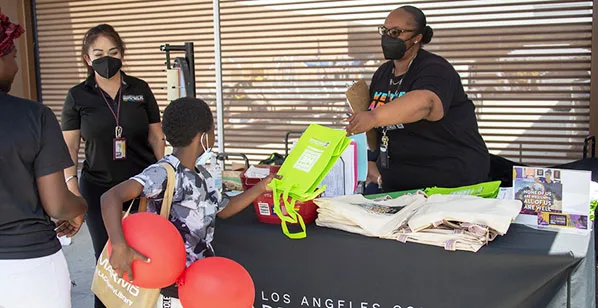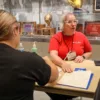
By Dianne Anderson
Depending on the topic at hand, Tracy Prince notices how some of his young clients get fidgety in the waiting line. That’s when he sees the problem, and he sets out to attack certain telltale signs head-on.
“Next thing you know someone is getting sentimental or someone is crying or someone is talking about a situation they had. If you look over as you’re talking, there are particular facial expressions. You see the way they’re sitting and their body language,” he said.
Behind the scissors and clippers, he’s heard just about every mental health issue known to man or woman, but he commends his mentor, a clinical psychologist, for giving him an edge to spot those in need of a word of encouragement.
Young people may not show it on the outside, but they are dealing with a lot of emotions.
“Their level of sensitivity is so great, it’s tearing them up. Society plays a big part in what’s going on, or imbalance of chemicals in their brain, or diet,” he said.,” said Prince, formerly in Carson, but recently moved to Gardena.
“Sometimes the adult Black men, we see the problem and collectively help out. They’ll step in,” he said.
They also teamed up for toys this year, with clients coming together for donations, for both Thanksgiving and Christmas.
“We had a city councilmember locate families in need and they came by. Now we’re doing toys and in doing so we meet a lot of families in need, and we have camaraderie with them. We use a lot of different avenues,” he said.
Not long ago, Prince also teamed up with one of his clients, Kara James, around the importance of Black mental health in the community, especially for youth.
James, a nurse practitioner with Planned Parenthood Los Angeles, initiated the Black Health Initiative last year. She said the Black Mental Health Outcomes in a recent LA County study shows concerning trends within the Black community, with 25.5% admitting the need for assistance and 17.9% having contemplated suicide.
“At work, I see and hear it,” she said “It’s something I notice and hear in places like my barbershop. Young african american boys and men are experiencing difficulties, underscoring the importance of initiatives to tackle mental health disparities.”
Dealing with mental health issues starts young for Black boys. She said it is complicated by societal biases and prejudices, and an uphill educational journey.
“[It has] long-term consequences, ranging from disproportionate school punishment to overrepresentation in special education. The criminal justice system exacerbates these issues by subjecting them to heightened scrutiny,” she said in an email.
Mental illness stigma in the Black community also prevents seeking the care and treatment they need. If untreated, she said mental health consequences can impair all aspects of life, from relationships to careers.
While the suicide rate has decreased nationally, the numbers are still high for Black teens, representing a leading cause of death, especially for males.
“This highlights an urgent issue in public health that requires immediate and specific measures to be taken. Societal pressures on youth to conform or compete, stigmatization of mental health issues that prevent people from getting help, and a lack of treatment options are all contributing factors to this upsurge,” she said.
One of the best ways to reach young Black males is in safe settings, like Black barbershops, which means more than a haircut.
“They’re community hubs where fellowship, conversation, and support thrive. Everyone from the OG’s, the older generation, to the kids, and even ladies like me come together, cultivating a distinct sense of community and trust,” she said.
She also keeps true to her roots, having lived in the community her whole life, dropped out of school to eventually become a nurse practitioner. She brings plenty of “hood knowledge” and breaks down obstacles with her ’63 Chevy Impala, a respected cultural icon.
In the Barber Shop settings, she also gives a “a dash of tough love,” opening the way for youth to talk about taboo topics and relationships. But her main message to all ages are proactive steps in health care, the need for frequent checkups, and prostate exams for older men.
The community should also know their HIV status, understand the need and use of condoms, and get tested for STDs.
Planned Parenthood and other community outreach programs are critical for reducing health disparities and challenges in African American communities, for Black men and also the lack of resources impacts Black women.
“The high maternal mortality rate among African American women is a major source of concern, emphasizing the importance of comprehensive and culturally appropriate care,” she said.
Planned Parenthood Los Angeles Black Health Initiative addresses those concerns by focusing on increasing African American community access to reproductive health care, cancer screenings, and mental health support.
“This effort intends to reduce health disparities by collaborating with community leaders, providing culturally relevant outreach, and training healthcare personnel in cultural competence, ultimately improving health outcomes and fostering healthcare equity,” she said.
For more information on Long Beach Health Center, see https://www.plannedparenthood.org/health-center/california/long-beach/90806/long-beach-central-10025-90070
To see the State of Black Los Angeles County study, see
https://bit.ly/4752NNM
For more https://www.plannedparenthood.org/planned-parenthood-los-angeles/black-health-initiative


